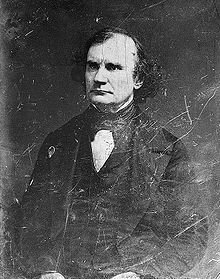
Back جيمس موراي ميسون Arabic جيمس موراى ميسون ARZ جیمز ام. میسون AZB James Murray Mason German جیمز ام. میسون Persian James M. Mason French James M. Mason Hungarian Джеймс Мюррей Мэйсон Kazakh جیمز مورې میسن Pashto/Pushto James M. Mason Swedish
James M. Mason | |
|---|---|
 | |
| President pro tempore of the United States Senate | |
| In office January 6, 1857 – March 4, 1857 | |
| Preceded by | Jesse D. Bright |
| Succeeded by | Thomas J. Rusk |
| United States Senator from Virginia | |
| In office January 21, 1847 – March 28, 1861 | |
| Preceded by | Isaac S. Pennybacker |
| Succeeded by | Waitman T. Willey |
| Member of the U.S. House of Representatives from Virginia's 15th district | |
| In office March 4, 1837 – March 3, 1839 | |
| Preceded by | Edward Lucas |
| Succeeded by | William Lucas |
| Member of the Virginia House of Delegates from Frederick County | |
| In office December 1, 1828 – December 4, 1831 Serving with William Castleman, William Wood | |
| Preceded by | William Barton |
| Succeeded by | Constituency reestablished |
| In office December 4, 1826 – December 2, 1827 Serving with James Ship | |
| Preceded by | George Kiger |
| Succeeded by | William Barton |
| Personal details | |
| Born | James Murray Mason November 3, 1798 Analostan Island, D.C., U.S. |
| Died | April 28, 1871 (aged 72) Alexandria, Virginia, U.S. |
| Political party | Democratic |
| Spouse | Eliza Chew |
| Education | University of Pennsylvania (BA) College of William and Mary (LLB) |
| Signature | |
James Murray Mason (November 3, 1798 – April 28, 1871) was an American lawyer and politician who became a Confederate diplomat. He served as senator from Virginia, having previously represented Frederick County, Virginia, in the Virginia House of Delegates.[1][2]
A grandson of George Mason, Mason strongly supported slavery as well as Virginia's secession as the American Civil War began. As chairman of the United States Senate Committee on Foreign Relations from 1851 until his expulsion in 1861 for supporting the Confederate States of America, Mason took great interest in protecting American cotton exporters. As the Confederacy's leading diplomat, he traveled to Europe seeking support, but proved unable to get the United Kingdom to recognize the Confederacy as a country. As Mason sailed to England in November 1861, the U.S. Navy captured his ship and detained him, in what became known as the Trent Affair. Released after two months, Mason continued his voyage, and assisted Confederate purchases from Britain and Europe but failed to achieve their diplomatic involvement. As the war ended, Mason went into exile in Canada, but later returned to Alexandria, Virginia, where he died in 1871.[3]
- ^ Lee, Michele (May 18, 2011). "James Murray Mason". Gunston Hall. Archived from the original on September 26, 2009. Retrieved March 7, 2009.
- ^ "Mason family of Virginia". The Political Graveyard. June 16, 2008. Archived from the original on April 4, 2013. Retrieved March 7, 2009.
- ^ Young, 1998.